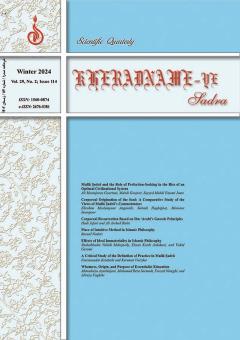Corporeal Resurrection Based on Ibn ‘Arabī’s Gnostic Principles
Subject Areas : Studies on gnosis and Islamic Kalam
Hadi Jafary
1
,
Ali Arshad Riahi
2
![]()
1 - PhD in Transcendent philosophy, University of Isfahan, Isfahan, Iran
2 - Professor at the Islamic Philosophy and Kalam Department, University of Isfahan, Isfahan, Iran
Keywords: corporeal resurrection, Ibn ‘Arabī, comprehensiveness, names, soul, renewal of likes, epiphany,
Abstract :
Ibn Arabi is one of the gnostics who has paid particular attention to Man’s corporeal resurrection and its quality in his works. When demonstrating corporeal resurrection, he mainly relies on unveiling and intuition rather than rational demonstration. However, the authors of this paper believe that Man’s posthumous corporeal dimension in purgatory and the hereafter can also be proved based on Ibn ‘Arabī’s gnostic principles. Apart from the quality of corporeal resurrection, the question is whether corporeal resurrection itself can be demonstrated relying on such principles or not. This study, which was carried out following the method of content analysis, aimed to provide a convenient response to this question and, thus, concluded that corporeal resurrection is demonstrable based on some of Ibn ‘Arabī’s principles such as Man’s distinction and determination in the process of ascent, the relationship between the macro-anthropo and micro-anthoropo, the theory of contrasting names, nobility of sensory faculties, creation of Man in God’s face, gnostic knowledge of the soul, Man’s level of comprehensiveness and moderation, and repetition in epiphany and renewal of likes. The authors also conclude that the idea that Man is originally an incorporeal existent and finally returns to his incorporeal birthplace is absurd. They argue that the human face must possess a body; hence, even if Shari’a has not spoken of corporeal resurrection, it can be proved based on gnostic principles.
قرآن کریم.
آملی، سیدحیدر (1362) اسرار الشریعة و اطوار الطریقة و انوار الحقیقة، تهران: مؤسسه مطالعات و تحقیقات فرهنگی.
ابراهیمی، حسن (1393) ابنعربیپژوهی، تهران: خانه کتاب.
ابنعربی، ابوبکر محمد (1377) ترجمان الاشواق، ترجمۀ گلبابا سعیدی، تهران: روزنه.
ابنعربی، ابوبکر محمد (1392) فصوص الحکم، شرح تلمسانی، تهران: سخن.
ابنعربی، ابوبکر محمد (1401ق) ترجمان الاشواق، بیروت: دارالفکر.
ابنعربی، ابوبکر محمد (1424ق) فتوحات مکیه، بیروت: دار الصادر.
ابنعربی، ابوبکر محمد (2002م/ الف) التدبیرات الالهیة فی المملکة النفس الانسانیة، در رسائل ابنعربی، ج6، بیروت: دار الفکر.
ابنعربی، ابوبکر محمد (2002م/ ب) عقلة المستوفز، در رسائل ابنعربی، ج2، بیروت: دار الفکر.
ایزوتسو، توشیهیکو (1385) مفاتیح الفصوص، کرمانشاه: دانشگاه رازی.
جامی، عبدالرحمن (1393) نقد النصوص فی شرح نقش النصوص، تهران: مؤسسۀ حکمت و فلسفه ایران.
جندی، مؤیدالدین (1387) شرح فصوص الحکم، قم: بوستان کتاب.
حسنزاده آملی، حسن (1378) ممد الهمم در شرح فصوص الحکم، تهران: وزارت فرهنگ و ارشاد اسلامی.
خوارزمی، تاجالدین حسین (1393) شرح فصوصالحکم ابنعربی، تهران: مولی.
رسولی شربیانی، رضا؛ عبداللهی، امیرحسین (1389) «معاد جسمانی از دیدگاه ابنعربی»، تأملات فلسفی، شمارۀ 5، ص36ـ23.
فاضل تونی، محمدحسین (1386) مجموعه رسایل عرفانی و فلسفی، قم: مطبوعات دینی.
فریدونی، محمدرضا (1377) «کیفیت معاد از دیدگاه ابنعربی»، مجله دانشکده ادبیات و علوم انسانی دانشگاه تهران، سری 37، شمارۀ 4، ص192ـ180.
قونوی، صدرالدین (1393) فکوک، ترجمۀ محمد خواجوی، تهران: مولی.
قیصری، داوود (1382) شرح فصوص الحکم، قم: بوستان کتاب.
کبیر، یحیی (1384) انسانشناسی در مکتب ابنترکه، قم: مطبوعات دینی.
کرمانی، علیرضا (1388) «معاد جسمانی از دیدگاه ابنعربی»، معرفت فلسفی، شمارۀ 24، ص104ـ67.
مفتاح، عبدالباقی (1385) کلیدهای فهم فصوص الحکم، ترجمۀ داود اسپرهم، تهران: نشر علم.


